Leadership and Management in Booker Group: A Detailed Report
VerifiedAdded on 2023/01/06
|18
|5348
|68
Report
AI Summary
This report provides a comprehensive analysis of leadership and management practices within Booker Group Limited, a UK-based food distribution retailer. It begins by distinguishing between the roles and characteristics of leaders and managers, examining the organizational structure and highlighting the company's divisional management approach. The report then delves into specific examples of how leadership and management functions are applied in various situational contexts, such as conflict resolution and time delivery services, and explores the application of leadership theories like situational and systems leadership. Furthermore, it investigates operations management approaches, emphasizing their importance in achieving business objectives and identifying factors within the business environment that impact operational management and decision-making. The report concludes with an evaluation of different theories and approaches to leadership and management, offering insights into how leaders and managers can improve efficiencies and successfully meet business objectives within Booker Group.
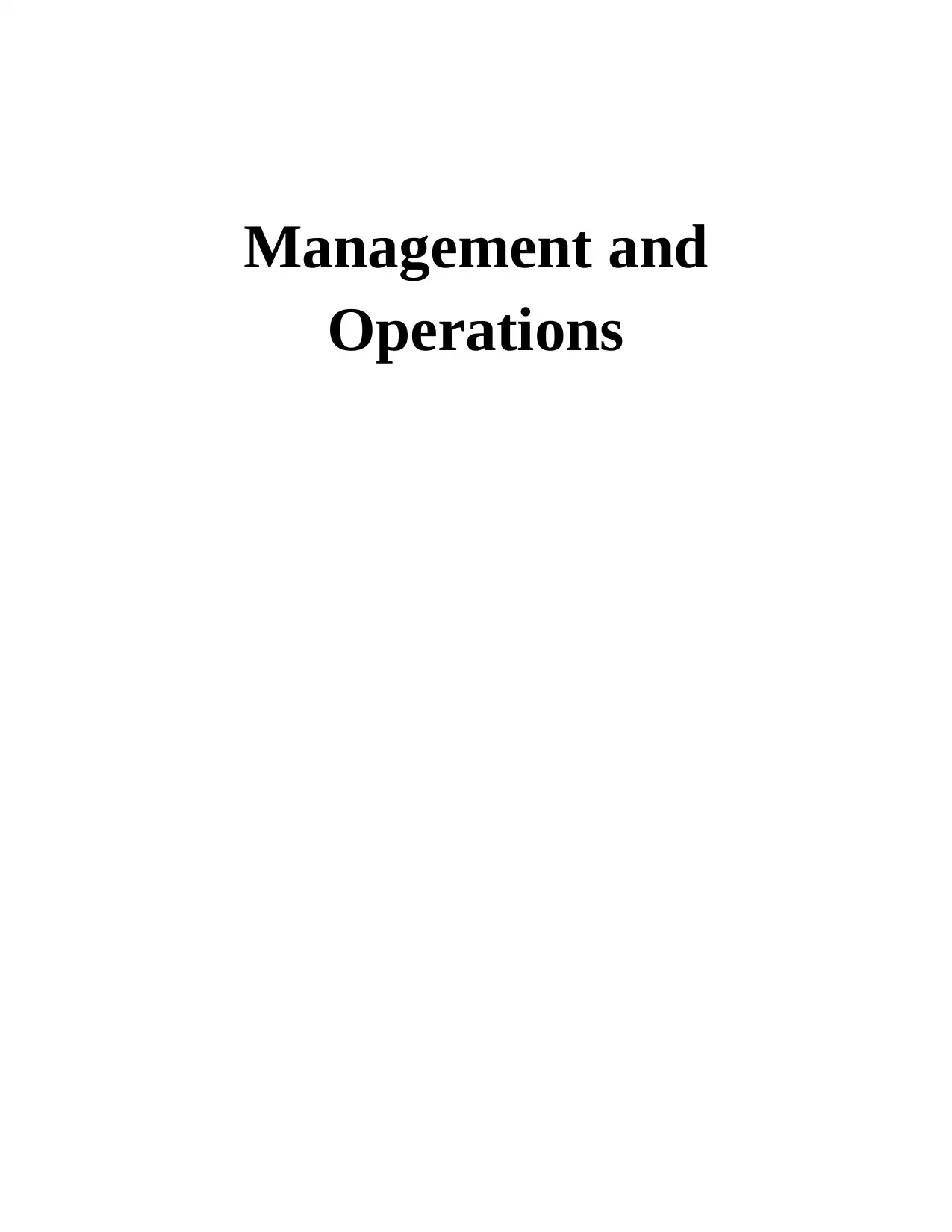
Management and
Operations
Operations
Paraphrase This Document
Need a fresh take? Get an instant paraphrase of this document with our AI Paraphraser

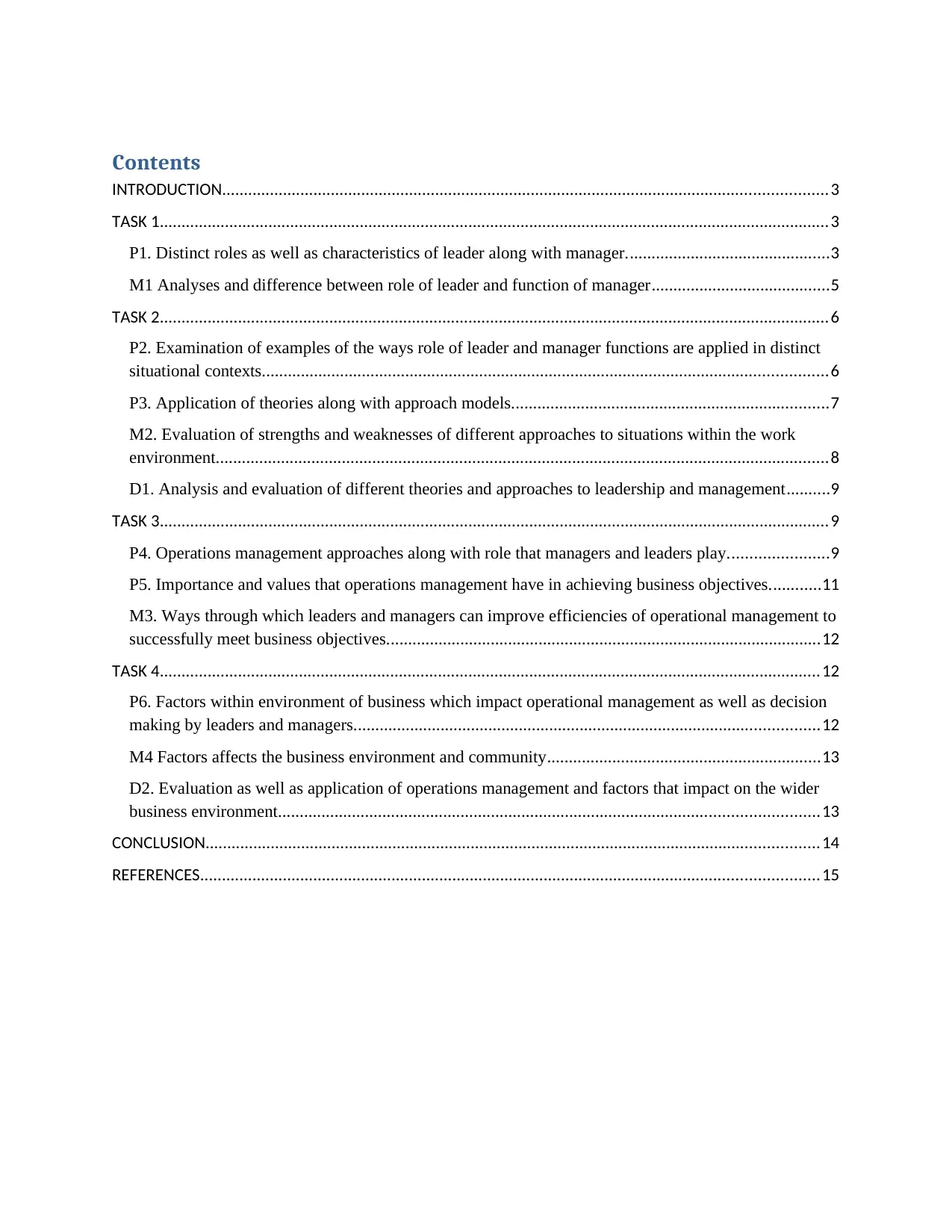
Contents
INTRODUCTION...........................................................................................................................................3
TASK 1..........................................................................................................................................................3
P1. Distinct roles as well as characteristics of leader along with manager...............................................3
M1 Analyses and difference between role of leader and function of manager.........................................5
TASK 2..........................................................................................................................................................6
P2. Examination of examples of the ways role of leader and manager functions are applied in distinct
situational contexts..................................................................................................................................6
P3. Application of theories along with approach models.........................................................................7
M2. Evaluation of strengths and weaknesses of different approaches to situations within the work
environment.............................................................................................................................................8
D1. Analysis and evaluation of different theories and approaches to leadership and management..........9
TASK 3..........................................................................................................................................................9
P4. Operations management approaches along with role that managers and leaders play.......................9
P5. Importance and values that operations management have in achieving business objectives............11
M3. Ways through which leaders and managers can improve efficiencies of operational management to
successfully meet business objectives....................................................................................................12
TASK 4........................................................................................................................................................12
P6. Factors within environment of business which impact operational management as well as decision
making by leaders and managers...........................................................................................................12
M4 Factors affects the business environment and community...............................................................13
D2. Evaluation as well as application of operations management and factors that impact on the wider
business environment............................................................................................................................13
CONCLUSION.............................................................................................................................................14
REFERENCES..............................................................................................................................................15
INTRODUCTION...........................................................................................................................................3
TASK 1..........................................................................................................................................................3
P1. Distinct roles as well as characteristics of leader along with manager...............................................3
M1 Analyses and difference between role of leader and function of manager.........................................5
TASK 2..........................................................................................................................................................6
P2. Examination of examples of the ways role of leader and manager functions are applied in distinct
situational contexts..................................................................................................................................6
P3. Application of theories along with approach models.........................................................................7
M2. Evaluation of strengths and weaknesses of different approaches to situations within the work
environment.............................................................................................................................................8
D1. Analysis and evaluation of different theories and approaches to leadership and management..........9
TASK 3..........................................................................................................................................................9
P4. Operations management approaches along with role that managers and leaders play.......................9
P5. Importance and values that operations management have in achieving business objectives............11
M3. Ways through which leaders and managers can improve efficiencies of operational management to
successfully meet business objectives....................................................................................................12
TASK 4........................................................................................................................................................12
P6. Factors within environment of business which impact operational management as well as decision
making by leaders and managers...........................................................................................................12
M4 Factors affects the business environment and community...............................................................13
D2. Evaluation as well as application of operations management and factors that impact on the wider
business environment............................................................................................................................13
CONCLUSION.............................................................................................................................................14
REFERENCES..............................................................................................................................................15
⊘ This is a preview!⊘
Do you want full access?
Subscribe today to unlock all pages.

Trusted by 1+ million students worldwide
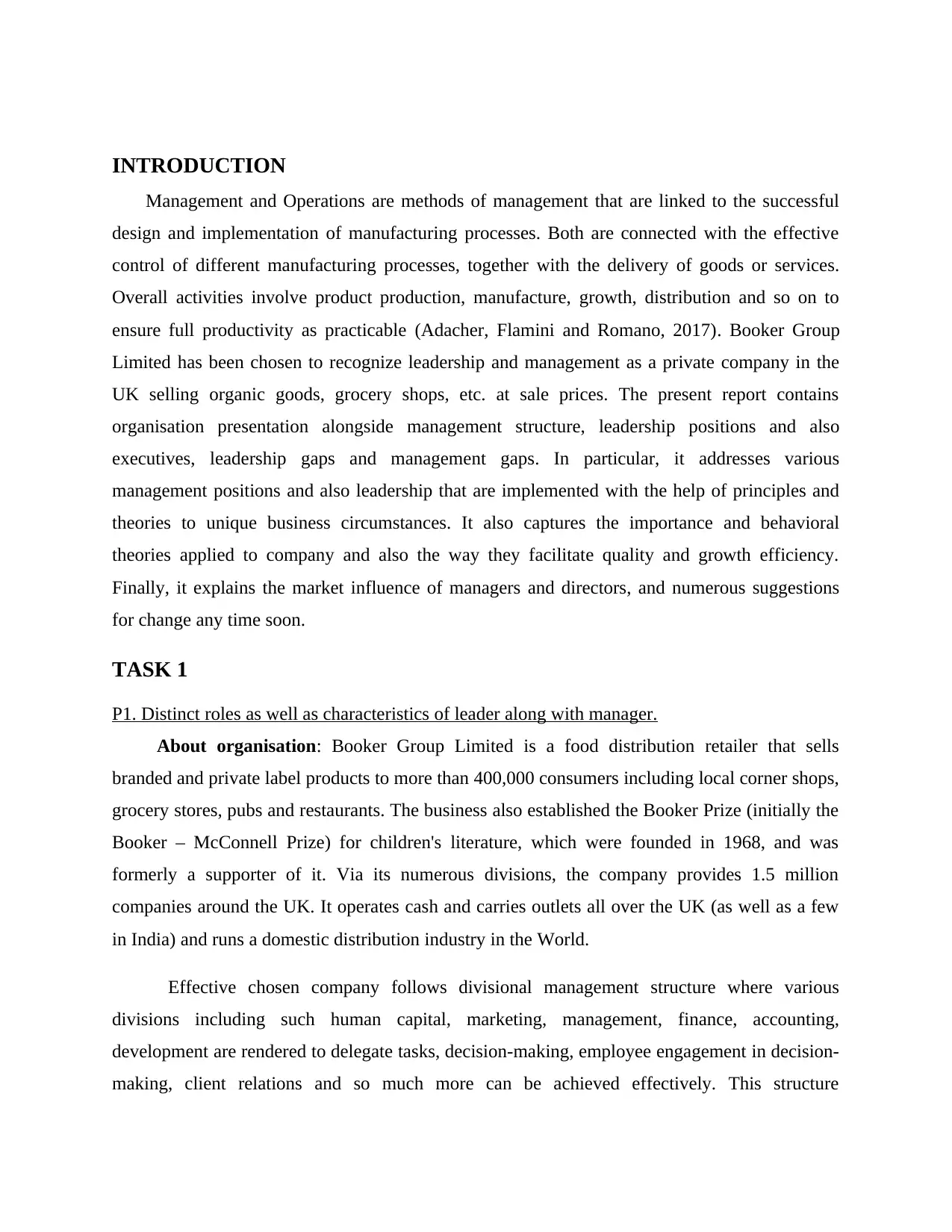
INTRODUCTION
Management and Operations are methods of management that are linked to the successful
design and implementation of manufacturing processes. Both are connected with the effective
control of different manufacturing processes, together with the delivery of goods or services.
Overall activities involve product production, manufacture, growth, distribution and so on to
ensure full productivity as practicable (Adacher, Flamini and Romano, 2017). Booker Group
Limited has been chosen to recognize leadership and management as a private company in the
UK selling organic goods, grocery shops, etc. at sale prices. The present report contains
organisation presentation alongside management structure, leadership positions and also
executives, leadership gaps and management gaps. In particular, it addresses various
management positions and also leadership that are implemented with the help of principles and
theories to unique business circumstances. It also captures the importance and behavioral
theories applied to company and also the way they facilitate quality and growth efficiency.
Finally, it explains the market influence of managers and directors, and numerous suggestions
for change any time soon.
TASK 1
P1. Distinct roles as well as characteristics of leader along with manager.
About organisation: Booker Group Limited is a food distribution retailer that sells
branded and private label products to more than 400,000 consumers including local corner shops,
grocery stores, pubs and restaurants. The business also established the Booker Prize (initially the
Booker – McConnell Prize) for children's literature, which were founded in 1968, and was
formerly a supporter of it. Via its numerous divisions, the company provides 1.5 million
companies around the UK. It operates cash and carries outlets all over the UK (as well as a few
in India) and runs a domestic distribution industry in the World.
Effective chosen company follows divisional management structure where various
divisions including such human capital, marketing, management, finance, accounting,
development are rendered to delegate tasks, decision-making, employee engagement in decision-
making, client relations and so much more can be achieved effectively. This structure
Management and Operations are methods of management that are linked to the successful
design and implementation of manufacturing processes. Both are connected with the effective
control of different manufacturing processes, together with the delivery of goods or services.
Overall activities involve product production, manufacture, growth, distribution and so on to
ensure full productivity as practicable (Adacher, Flamini and Romano, 2017). Booker Group
Limited has been chosen to recognize leadership and management as a private company in the
UK selling organic goods, grocery shops, etc. at sale prices. The present report contains
organisation presentation alongside management structure, leadership positions and also
executives, leadership gaps and management gaps. In particular, it addresses various
management positions and also leadership that are implemented with the help of principles and
theories to unique business circumstances. It also captures the importance and behavioral
theories applied to company and also the way they facilitate quality and growth efficiency.
Finally, it explains the market influence of managers and directors, and numerous suggestions
for change any time soon.
TASK 1
P1. Distinct roles as well as characteristics of leader along with manager.
About organisation: Booker Group Limited is a food distribution retailer that sells
branded and private label products to more than 400,000 consumers including local corner shops,
grocery stores, pubs and restaurants. The business also established the Booker Prize (initially the
Booker – McConnell Prize) for children's literature, which were founded in 1968, and was
formerly a supporter of it. Via its numerous divisions, the company provides 1.5 million
companies around the UK. It operates cash and carries outlets all over the UK (as well as a few
in India) and runs a domestic distribution industry in the World.
Effective chosen company follows divisional management structure where various
divisions including such human capital, marketing, management, finance, accounting,
development are rendered to delegate tasks, decision-making, employee engagement in decision-
making, client relations and so much more can be achieved effectively. This structure
Paraphrase This Document
Need a fresh take? Get an instant paraphrase of this document with our AI Paraphraser
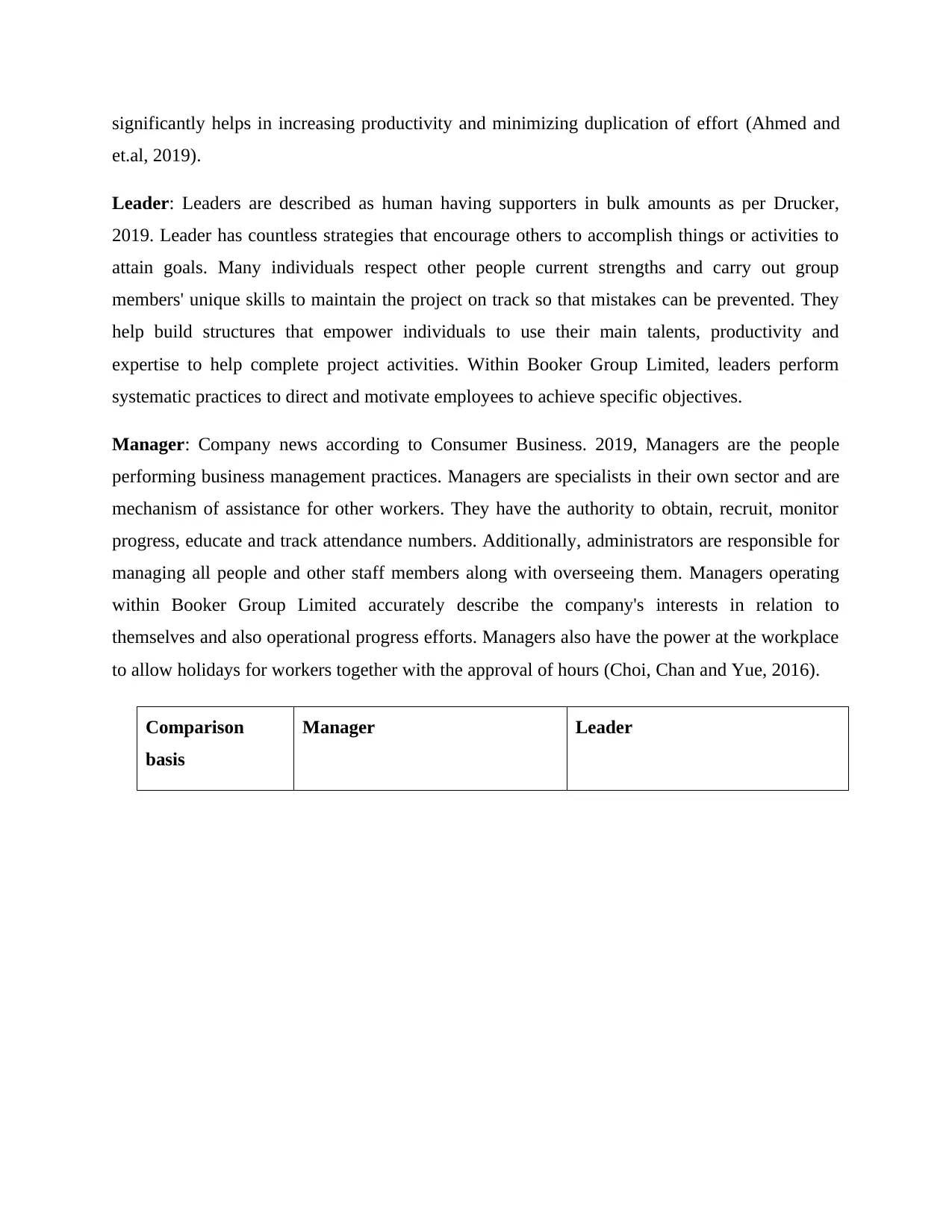
significantly helps in increasing productivity and minimizing duplication of effort (Ahmed and
et.al, 2019).
Leader: Leaders are described as human having supporters in bulk amounts as per Drucker,
2019. Leader has countless strategies that encourage others to accomplish things or activities to
attain goals. Many individuals respect other people current strengths and carry out group
members' unique skills to maintain the project on track so that mistakes can be prevented. They
help build structures that empower individuals to use their main talents, productivity and
expertise to help complete project activities. Within Booker Group Limited, leaders perform
systematic practices to direct and motivate employees to achieve specific objectives.
Manager: Company news according to Consumer Business. 2019, Managers are the people
performing business management practices. Managers are specialists in their own sector and are
mechanism of assistance for other workers. They have the authority to obtain, recruit, monitor
progress, educate and track attendance numbers. Additionally, administrators are responsible for
managing all people and other staff members along with overseeing them. Managers operating
within Booker Group Limited accurately describe the company's interests in relation to
themselves and also operational progress efforts. Managers also have the power at the workplace
to allow holidays for workers together with the approval of hours (Choi, Chan and Yue, 2016).
Comparison
basis
Manager Leader
et.al, 2019).
Leader: Leaders are described as human having supporters in bulk amounts as per Drucker,
2019. Leader has countless strategies that encourage others to accomplish things or activities to
attain goals. Many individuals respect other people current strengths and carry out group
members' unique skills to maintain the project on track so that mistakes can be prevented. They
help build structures that empower individuals to use their main talents, productivity and
expertise to help complete project activities. Within Booker Group Limited, leaders perform
systematic practices to direct and motivate employees to achieve specific objectives.
Manager: Company news according to Consumer Business. 2019, Managers are the people
performing business management practices. Managers are specialists in their own sector and are
mechanism of assistance for other workers. They have the authority to obtain, recruit, monitor
progress, educate and track attendance numbers. Additionally, administrators are responsible for
managing all people and other staff members along with overseeing them. Managers operating
within Booker Group Limited accurately describe the company's interests in relation to
themselves and also operational progress efforts. Managers also have the power at the workplace
to allow holidays for workers together with the approval of hours (Choi, Chan and Yue, 2016).
Comparison
basis
Manager Leader
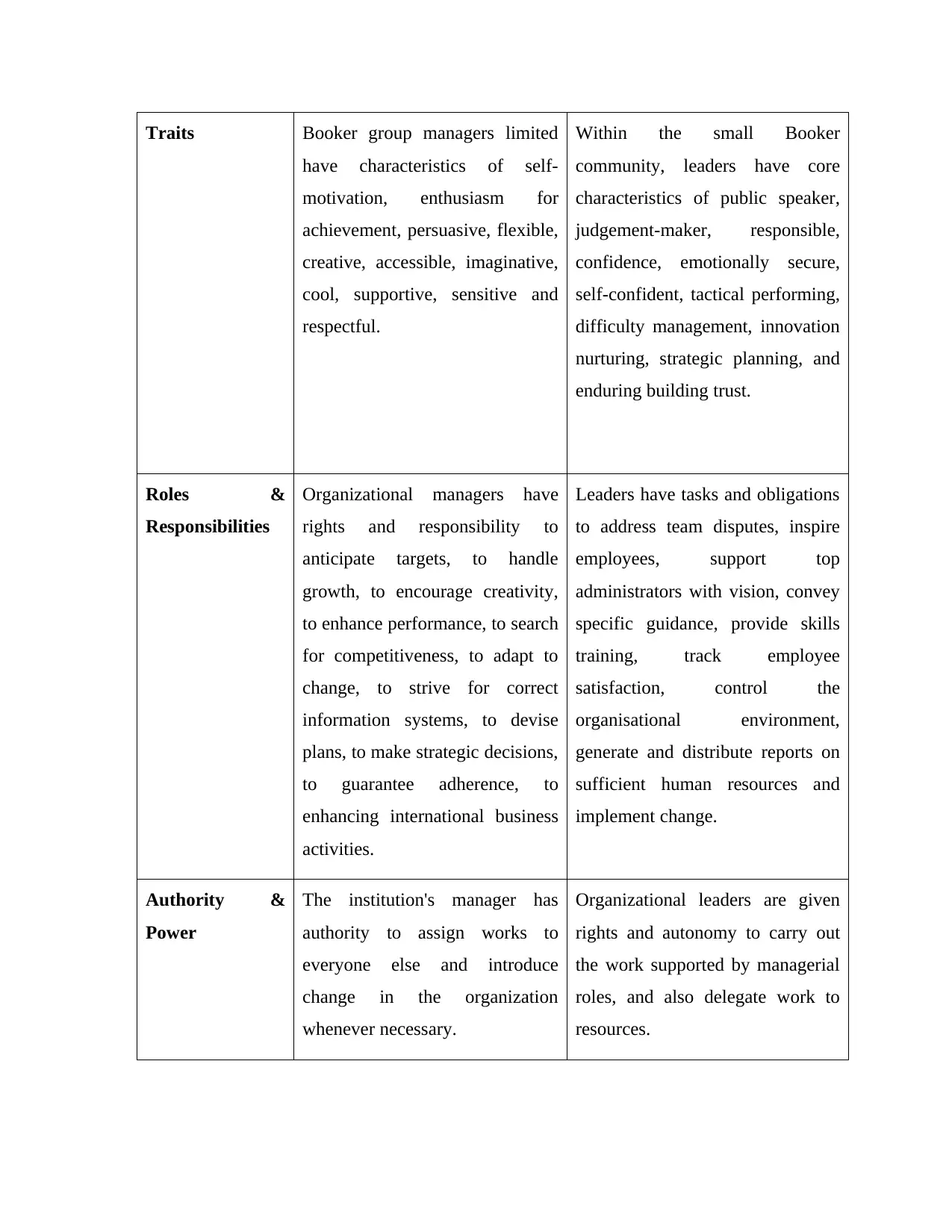
Traits Booker group managers limited
have characteristics of self-
motivation, enthusiasm for
achievement, persuasive, flexible,
creative, accessible, imaginative,
cool, supportive, sensitive and
respectful.
Within the small Booker
community, leaders have core
characteristics of public speaker,
judgement-maker, responsible,
confidence, emotionally secure,
self-confident, tactical performing,
difficulty management, innovation
nurturing, strategic planning, and
enduring building trust.
Roles &
Responsibilities
Organizational managers have
rights and responsibility to
anticipate targets, to handle
growth, to encourage creativity,
to enhance performance, to search
for competitiveness, to adapt to
change, to strive for correct
information systems, to devise
plans, to make strategic decisions,
to guarantee adherence, to
enhancing international business
activities.
Leaders have tasks and obligations
to address team disputes, inspire
employees, support top
administrators with vision, convey
specific guidance, provide skills
training, track employee
satisfaction, control the
organisational environment,
generate and distribute reports on
sufficient human resources and
implement change.
Authority &
Power
The institution's manager has
authority to assign works to
everyone else and introduce
change in the organization
whenever necessary.
Organizational leaders are given
rights and autonomy to carry out
the work supported by managerial
roles, and also delegate work to
resources.
have characteristics of self-
motivation, enthusiasm for
achievement, persuasive, flexible,
creative, accessible, imaginative,
cool, supportive, sensitive and
respectful.
Within the small Booker
community, leaders have core
characteristics of public speaker,
judgement-maker, responsible,
confidence, emotionally secure,
self-confident, tactical performing,
difficulty management, innovation
nurturing, strategic planning, and
enduring building trust.
Roles &
Responsibilities
Organizational managers have
rights and responsibility to
anticipate targets, to handle
growth, to encourage creativity,
to enhance performance, to search
for competitiveness, to adapt to
change, to strive for correct
information systems, to devise
plans, to make strategic decisions,
to guarantee adherence, to
enhancing international business
activities.
Leaders have tasks and obligations
to address team disputes, inspire
employees, support top
administrators with vision, convey
specific guidance, provide skills
training, track employee
satisfaction, control the
organisational environment,
generate and distribute reports on
sufficient human resources and
implement change.
Authority &
Power
The institution's manager has
authority to assign works to
everyone else and introduce
change in the organization
whenever necessary.
Organizational leaders are given
rights and autonomy to carry out
the work supported by managerial
roles, and also delegate work to
resources.
⊘ This is a preview!⊘
Do you want full access?
Subscribe today to unlock all pages.

Trusted by 1+ million students worldwide
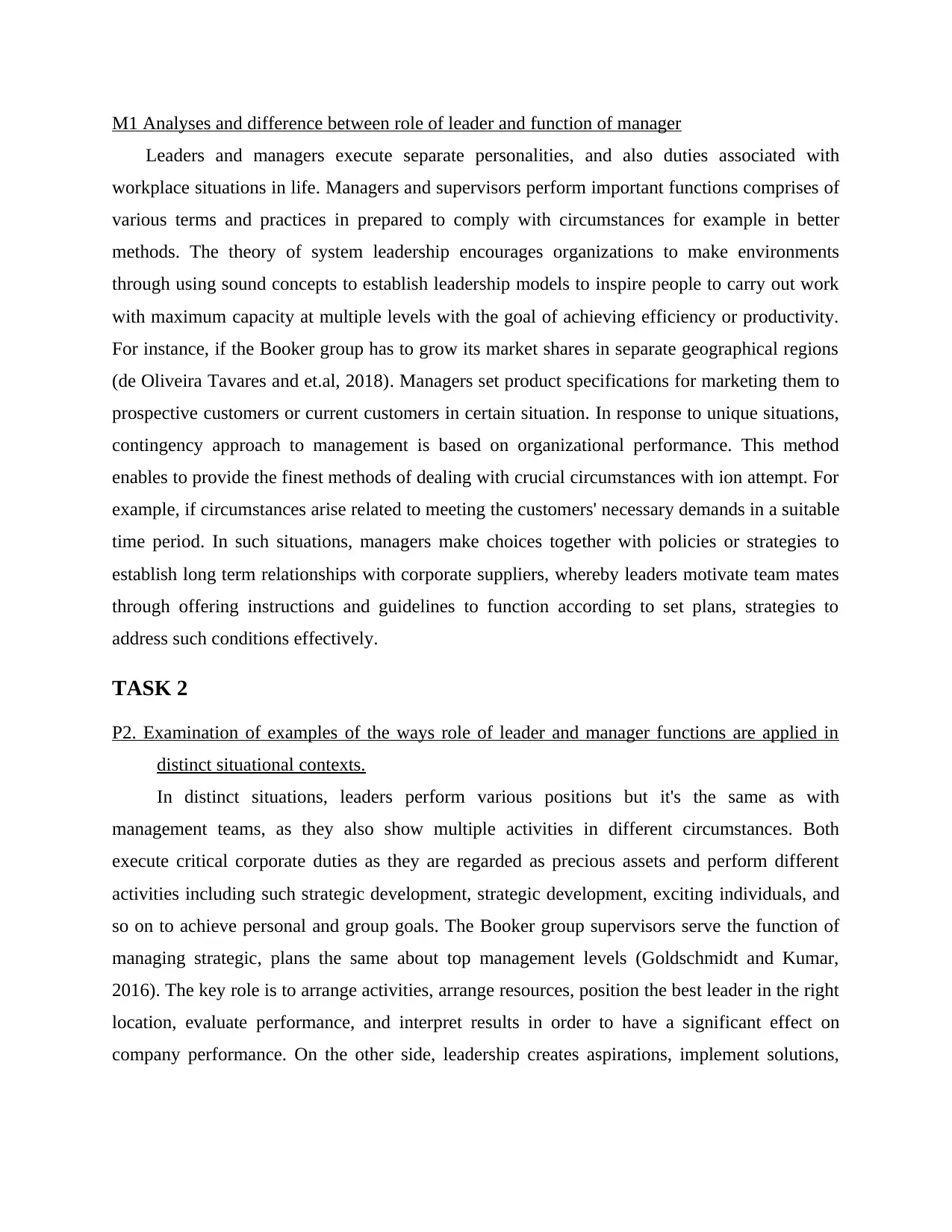
M1 Analyses and difference between role of leader and function of manager
Leaders and managers execute separate personalities, and also duties associated with
workplace situations in life. Managers and supervisors perform important functions comprises of
various terms and practices in prepared to comply with circumstances for example in better
methods. The theory of system leadership encourages organizations to make environments
through using sound concepts to establish leadership models to inspire people to carry out work
with maximum capacity at multiple levels with the goal of achieving efficiency or productivity.
For instance, if the Booker group has to grow its market shares in separate geographical regions
(de Oliveira Tavares and et.al, 2018). Managers set product specifications for marketing them to
prospective customers or current customers in certain situation. In response to unique situations,
contingency approach to management is based on organizational performance. This method
enables to provide the finest methods of dealing with crucial circumstances with ion attempt. For
example, if circumstances arise related to meeting the customers' necessary demands in a suitable
time period. In such situations, managers make choices together with policies or strategies to
establish long term relationships with corporate suppliers, whereby leaders motivate team mates
through offering instructions and guidelines to function according to set plans, strategies to
address such conditions effectively.
TASK 2
P2. Examination of examples of the ways role of leader and manager functions are applied in
distinct situational contexts.
In distinct situations, leaders perform various positions but it's the same as with
management teams, as they also show multiple activities in different circumstances. Both
execute critical corporate duties as they are regarded as precious assets and perform different
activities including such strategic development, strategic development, exciting individuals, and
so on to achieve personal and group goals. The Booker group supervisors serve the function of
managing strategic, plans the same about top management levels (Goldschmidt and Kumar,
2016). The key role is to arrange activities, arrange resources, position the best leader in the right
location, evaluate performance, and interpret results in order to have a significant effect on
company performance. On the other side, leadership creates aspirations, implement solutions,
Leaders and managers execute separate personalities, and also duties associated with
workplace situations in life. Managers and supervisors perform important functions comprises of
various terms and practices in prepared to comply with circumstances for example in better
methods. The theory of system leadership encourages organizations to make environments
through using sound concepts to establish leadership models to inspire people to carry out work
with maximum capacity at multiple levels with the goal of achieving efficiency or productivity.
For instance, if the Booker group has to grow its market shares in separate geographical regions
(de Oliveira Tavares and et.al, 2018). Managers set product specifications for marketing them to
prospective customers or current customers in certain situation. In response to unique situations,
contingency approach to management is based on organizational performance. This method
enables to provide the finest methods of dealing with crucial circumstances with ion attempt. For
example, if circumstances arise related to meeting the customers' necessary demands in a suitable
time period. In such situations, managers make choices together with policies or strategies to
establish long term relationships with corporate suppliers, whereby leaders motivate team mates
through offering instructions and guidelines to function according to set plans, strategies to
address such conditions effectively.
TASK 2
P2. Examination of examples of the ways role of leader and manager functions are applied in
distinct situational contexts.
In distinct situations, leaders perform various positions but it's the same as with
management teams, as they also show multiple activities in different circumstances. Both
execute critical corporate duties as they are regarded as precious assets and perform different
activities including such strategic development, strategic development, exciting individuals, and
so on to achieve personal and group goals. The Booker group supervisors serve the function of
managing strategic, plans the same about top management levels (Goldschmidt and Kumar,
2016). The key role is to arrange activities, arrange resources, position the best leader in the right
location, evaluate performance, and interpret results in order to have a significant effect on
company performance. On the other side, leadership creates aspirations, implement solutions,
Paraphrase This Document
Need a fresh take? Get an instant paraphrase of this document with our AI Paraphraser
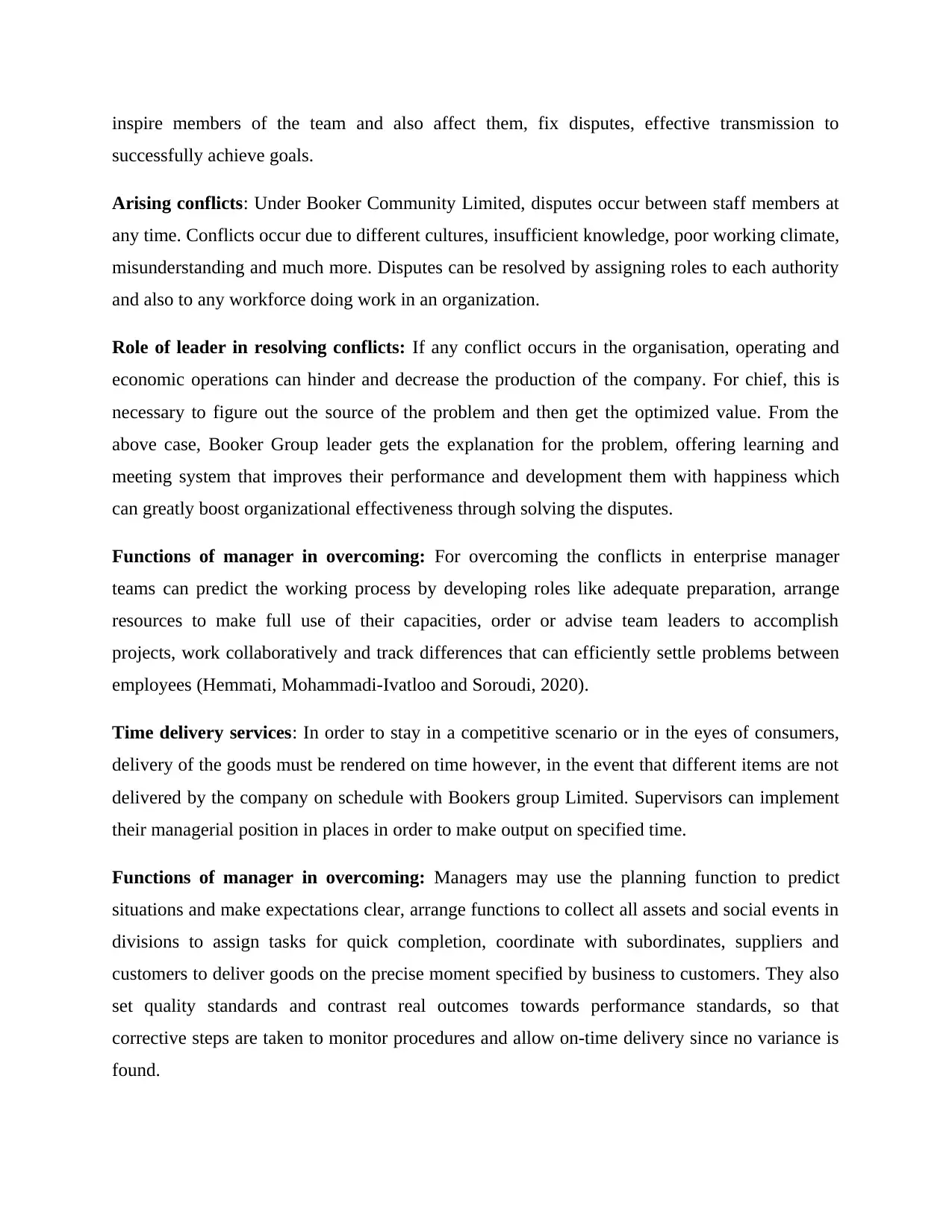
inspire members of the team and also affect them, fix disputes, effective transmission to
successfully achieve goals.
Arising conflicts: Under Booker Community Limited, disputes occur between staff members at
any time. Conflicts occur due to different cultures, insufficient knowledge, poor working climate,
misunderstanding and much more. Disputes can be resolved by assigning roles to each authority
and also to any workforce doing work in an organization.
Role of leader in resolving conflicts: If any conflict occurs in the organisation, operating and
economic operations can hinder and decrease the production of the company. For chief, this is
necessary to figure out the source of the problem and then get the optimized value. From the
above case, Booker Group leader gets the explanation for the problem, offering learning and
meeting system that improves their performance and development them with happiness which
can greatly boost organizational effectiveness through solving the disputes.
Functions of manager in overcoming: For overcoming the conflicts in enterprise manager
teams can predict the working process by developing roles like adequate preparation, arrange
resources to make full use of their capacities, order or advise team leaders to accomplish
projects, work collaboratively and track differences that can efficiently settle problems between
employees (Hemmati, Mohammadi-Ivatloo and Soroudi, 2020).
Time delivery services: In order to stay in a competitive scenario or in the eyes of consumers,
delivery of the goods must be rendered on time however, in the event that different items are not
delivered by the company on schedule with Bookers group Limited. Supervisors can implement
their managerial position in places in order to make output on specified time.
Functions of manager in overcoming: Managers may use the planning function to predict
situations and make expectations clear, arrange functions to collect all assets and social events in
divisions to assign tasks for quick completion, coordinate with subordinates, suppliers and
customers to deliver goods on the precise moment specified by business to customers. They also
set quality standards and contrast real outcomes towards performance standards, so that
corrective steps are taken to monitor procedures and allow on-time delivery since no variance is
found.
successfully achieve goals.
Arising conflicts: Under Booker Community Limited, disputes occur between staff members at
any time. Conflicts occur due to different cultures, insufficient knowledge, poor working climate,
misunderstanding and much more. Disputes can be resolved by assigning roles to each authority
and also to any workforce doing work in an organization.
Role of leader in resolving conflicts: If any conflict occurs in the organisation, operating and
economic operations can hinder and decrease the production of the company. For chief, this is
necessary to figure out the source of the problem and then get the optimized value. From the
above case, Booker Group leader gets the explanation for the problem, offering learning and
meeting system that improves their performance and development them with happiness which
can greatly boost organizational effectiveness through solving the disputes.
Functions of manager in overcoming: For overcoming the conflicts in enterprise manager
teams can predict the working process by developing roles like adequate preparation, arrange
resources to make full use of their capacities, order or advise team leaders to accomplish
projects, work collaboratively and track differences that can efficiently settle problems between
employees (Hemmati, Mohammadi-Ivatloo and Soroudi, 2020).
Time delivery services: In order to stay in a competitive scenario or in the eyes of consumers,
delivery of the goods must be rendered on time however, in the event that different items are not
delivered by the company on schedule with Bookers group Limited. Supervisors can implement
their managerial position in places in order to make output on specified time.
Functions of manager in overcoming: Managers may use the planning function to predict
situations and make expectations clear, arrange functions to collect all assets and social events in
divisions to assign tasks for quick completion, coordinate with subordinates, suppliers and
customers to deliver goods on the precise moment specified by business to customers. They also
set quality standards and contrast real outcomes towards performance standards, so that
corrective steps are taken to monitor procedures and allow on-time delivery since no variance is
found.
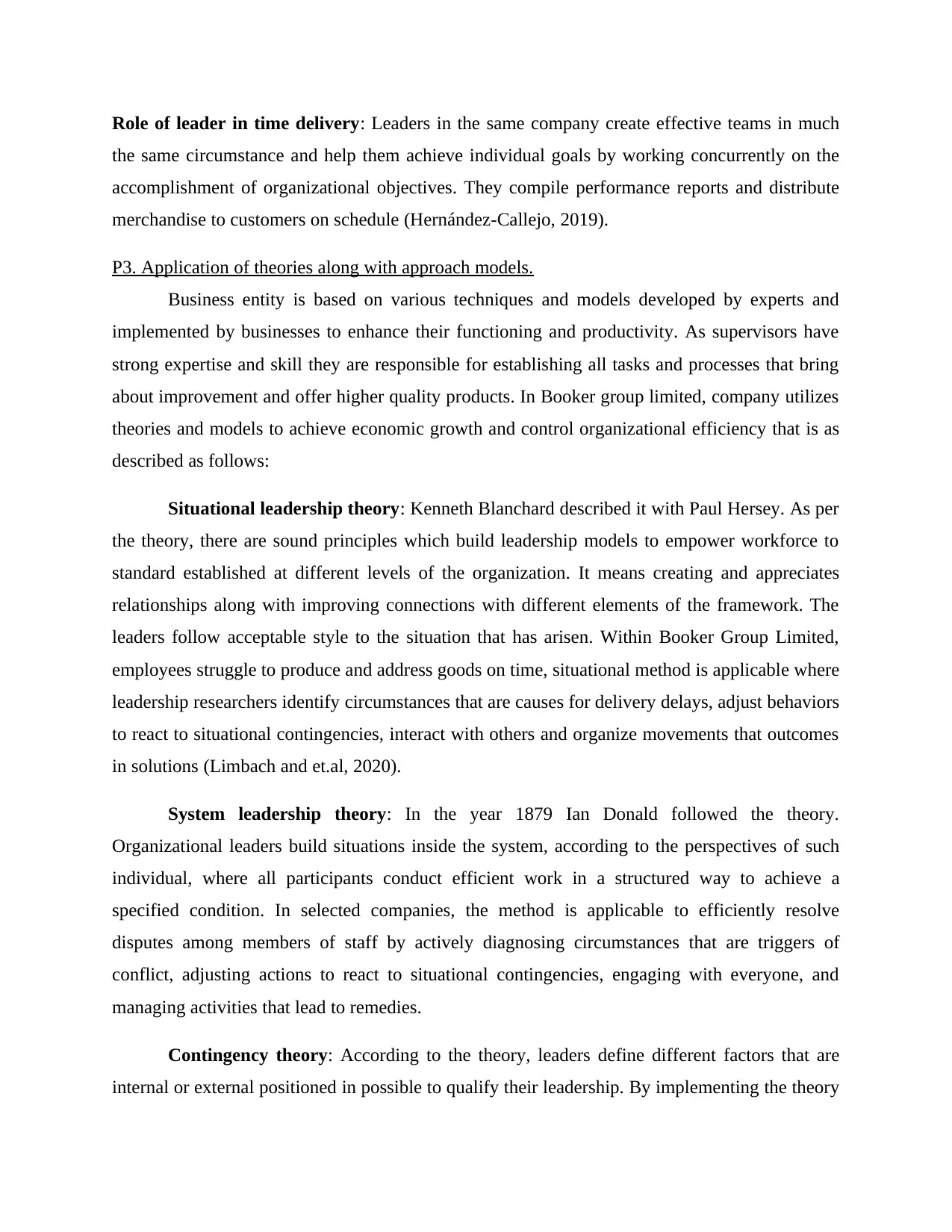
Role of leader in time delivery: Leaders in the same company create effective teams in much
the same circumstance and help them achieve individual goals by working concurrently on the
accomplishment of organizational objectives. They compile performance reports and distribute
merchandise to customers on schedule (Hernández-Callejo, 2019).
P3. Application of theories along with approach models.
Business entity is based on various techniques and models developed by experts and
implemented by businesses to enhance their functioning and productivity. As supervisors have
strong expertise and skill they are responsible for establishing all tasks and processes that bring
about improvement and offer higher quality products. In Booker group limited, company utilizes
theories and models to achieve economic growth and control organizational efficiency that is as
described as follows:
Situational leadership theory: Kenneth Blanchard described it with Paul Hersey. As per
the theory, there are sound principles which build leadership models to empower workforce to
standard established at different levels of the organization. It means creating and appreciates
relationships along with improving connections with different elements of the framework. The
leaders follow acceptable style to the situation that has arisen. Within Booker Group Limited,
employees struggle to produce and address goods on time, situational method is applicable where
leadership researchers identify circumstances that are causes for delivery delays, adjust behaviors
to react to situational contingencies, interact with others and organize movements that outcomes
in solutions (Limbach and et.al, 2020).
System leadership theory: In the year 1879 Ian Donald followed the theory.
Organizational leaders build situations inside the system, according to the perspectives of such
individual, where all participants conduct efficient work in a structured way to achieve a
specified condition. In selected companies, the method is applicable to efficiently resolve
disputes among members of staff by actively diagnosing circumstances that are triggers of
conflict, adjusting actions to react to situational contingencies, engaging with everyone, and
managing activities that lead to remedies.
Contingency theory: According to the theory, leaders define different factors that are
internal or external positioned in possible to qualify their leadership. By implementing the theory
the same circumstance and help them achieve individual goals by working concurrently on the
accomplishment of organizational objectives. They compile performance reports and distribute
merchandise to customers on schedule (Hernández-Callejo, 2019).
P3. Application of theories along with approach models.
Business entity is based on various techniques and models developed by experts and
implemented by businesses to enhance their functioning and productivity. As supervisors have
strong expertise and skill they are responsible for establishing all tasks and processes that bring
about improvement and offer higher quality products. In Booker group limited, company utilizes
theories and models to achieve economic growth and control organizational efficiency that is as
described as follows:
Situational leadership theory: Kenneth Blanchard described it with Paul Hersey. As per
the theory, there are sound principles which build leadership models to empower workforce to
standard established at different levels of the organization. It means creating and appreciates
relationships along with improving connections with different elements of the framework. The
leaders follow acceptable style to the situation that has arisen. Within Booker Group Limited,
employees struggle to produce and address goods on time, situational method is applicable where
leadership researchers identify circumstances that are causes for delivery delays, adjust behaviors
to react to situational contingencies, interact with others and organize movements that outcomes
in solutions (Limbach and et.al, 2020).
System leadership theory: In the year 1879 Ian Donald followed the theory.
Organizational leaders build situations inside the system, according to the perspectives of such
individual, where all participants conduct efficient work in a structured way to achieve a
specified condition. In selected companies, the method is applicable to efficiently resolve
disputes among members of staff by actively diagnosing circumstances that are triggers of
conflict, adjusting actions to react to situational contingencies, engaging with everyone, and
managing activities that lead to remedies.
Contingency theory: According to the theory, leaders define different factors that are
internal or external positioned in possible to qualify their leadership. By implementing the theory
⊘ This is a preview!⊘
Do you want full access?
Subscribe today to unlock all pages.

Trusted by 1+ million students worldwide
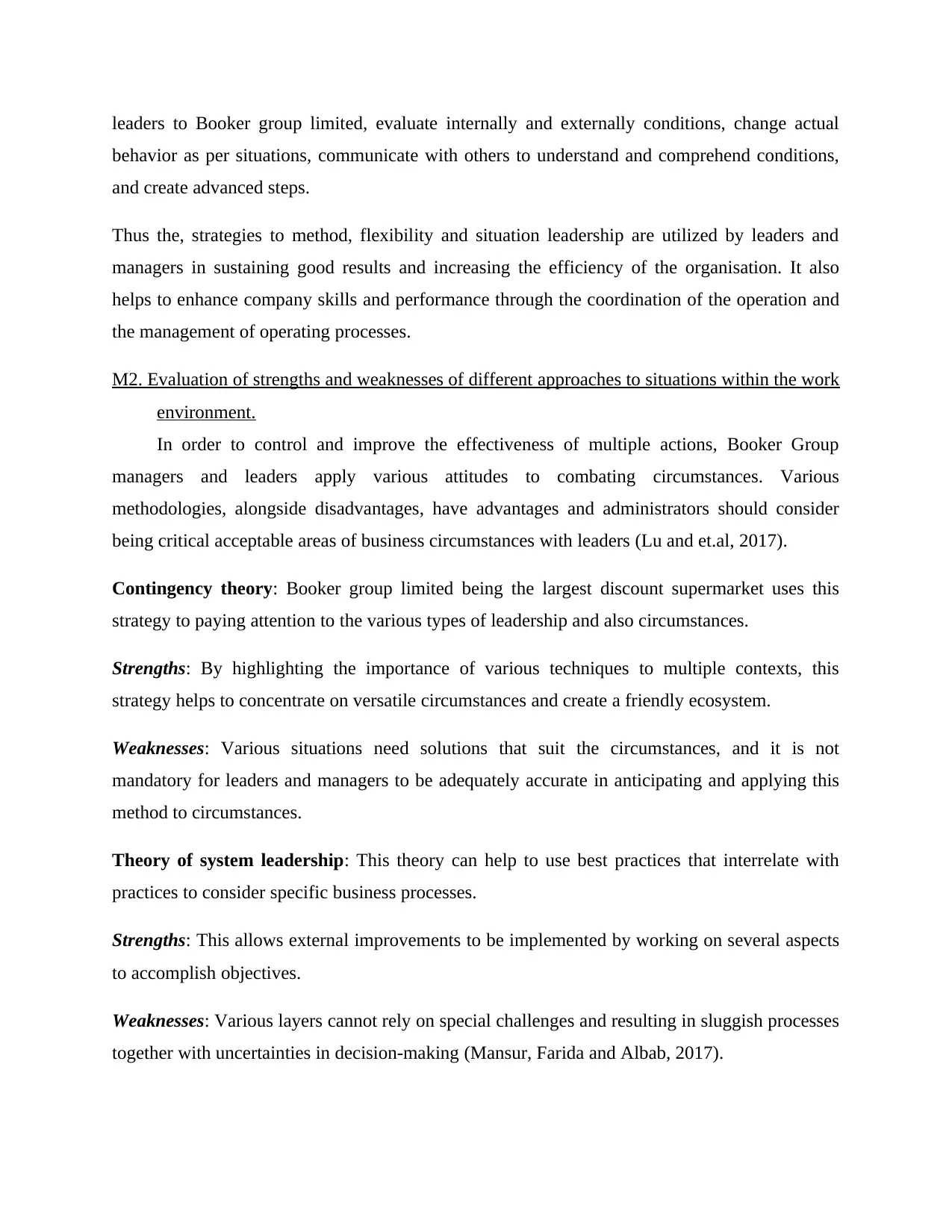
leaders to Booker group limited, evaluate internally and externally conditions, change actual
behavior as per situations, communicate with others to understand and comprehend conditions,
and create advanced steps.
Thus the, strategies to method, flexibility and situation leadership are utilized by leaders and
managers in sustaining good results and increasing the efficiency of the organisation. It also
helps to enhance company skills and performance through the coordination of the operation and
the management of operating processes.
M2. Evaluation of strengths and weaknesses of different approaches to situations within the work
environment.
In order to control and improve the effectiveness of multiple actions, Booker Group
managers and leaders apply various attitudes to combating circumstances. Various
methodologies, alongside disadvantages, have advantages and administrators should consider
being critical acceptable areas of business circumstances with leaders (Lu and et.al, 2017).
Contingency theory: Booker group limited being the largest discount supermarket uses this
strategy to paying attention to the various types of leadership and also circumstances.
Strengths: By highlighting the importance of various techniques to multiple contexts, this
strategy helps to concentrate on versatile circumstances and create a friendly ecosystem.
Weaknesses: Various situations need solutions that suit the circumstances, and it is not
mandatory for leaders and managers to be adequately accurate in anticipating and applying this
method to circumstances.
Theory of system leadership: This theory can help to use best practices that interrelate with
practices to consider specific business processes.
Strengths: This allows external improvements to be implemented by working on several aspects
to accomplish objectives.
Weaknesses: Various layers cannot rely on special challenges and resulting in sluggish processes
together with uncertainties in decision-making (Mansur, Farida and Albab, 2017).
behavior as per situations, communicate with others to understand and comprehend conditions,
and create advanced steps.
Thus the, strategies to method, flexibility and situation leadership are utilized by leaders and
managers in sustaining good results and increasing the efficiency of the organisation. It also
helps to enhance company skills and performance through the coordination of the operation and
the management of operating processes.
M2. Evaluation of strengths and weaknesses of different approaches to situations within the work
environment.
In order to control and improve the effectiveness of multiple actions, Booker Group
managers and leaders apply various attitudes to combating circumstances. Various
methodologies, alongside disadvantages, have advantages and administrators should consider
being critical acceptable areas of business circumstances with leaders (Lu and et.al, 2017).
Contingency theory: Booker group limited being the largest discount supermarket uses this
strategy to paying attention to the various types of leadership and also circumstances.
Strengths: By highlighting the importance of various techniques to multiple contexts, this
strategy helps to concentrate on versatile circumstances and create a friendly ecosystem.
Weaknesses: Various situations need solutions that suit the circumstances, and it is not
mandatory for leaders and managers to be adequately accurate in anticipating and applying this
method to circumstances.
Theory of system leadership: This theory can help to use best practices that interrelate with
practices to consider specific business processes.
Strengths: This allows external improvements to be implemented by working on several aspects
to accomplish objectives.
Weaknesses: Various layers cannot rely on special challenges and resulting in sluggish processes
together with uncertainties in decision-making (Mansur, Farida and Albab, 2017).
Paraphrase This Document
Need a fresh take? Get an instant paraphrase of this document with our AI Paraphraser
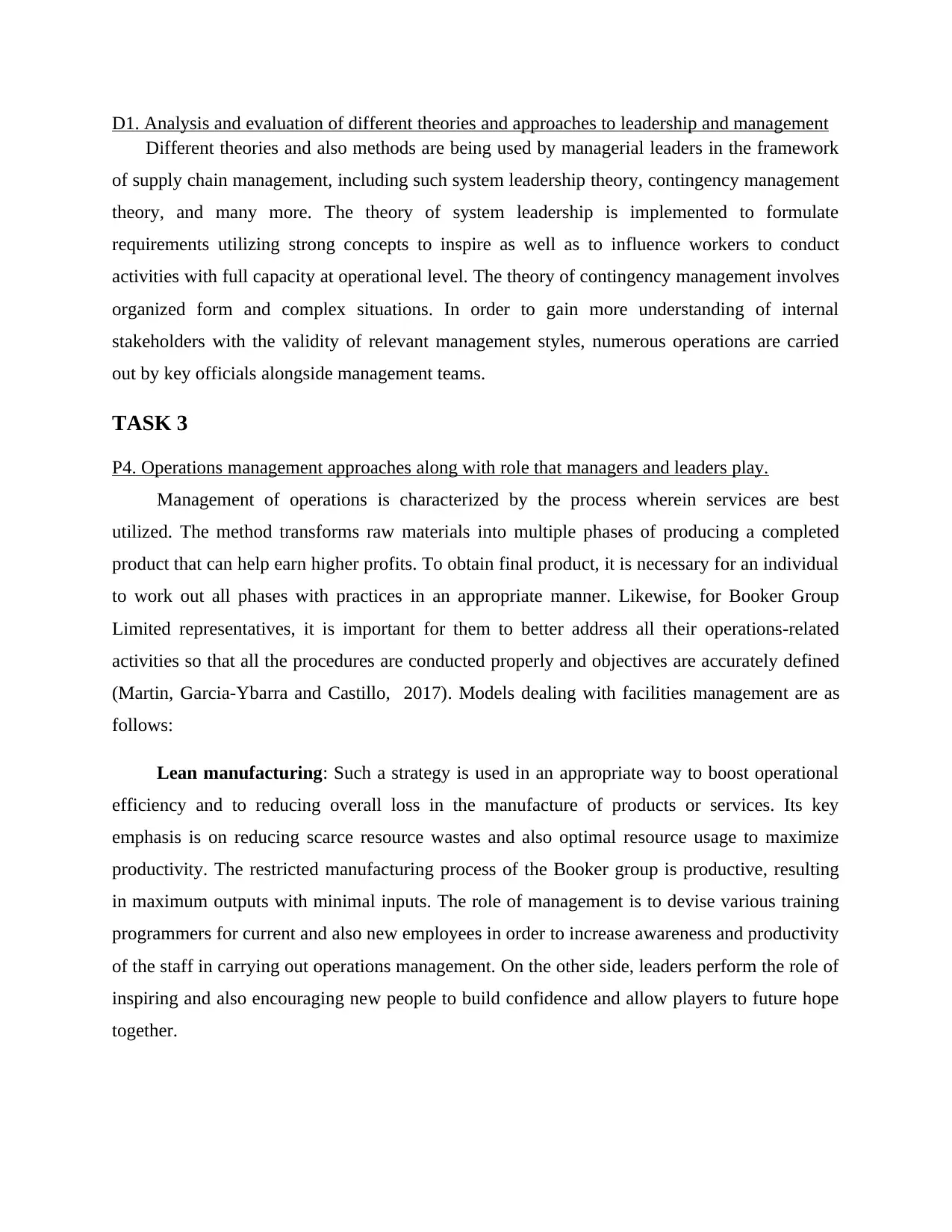
D1. Analysis and evaluation of different theories and approaches to leadership and management
Different theories and also methods are being used by managerial leaders in the framework
of supply chain management, including such system leadership theory, contingency management
theory, and many more. The theory of system leadership is implemented to formulate
requirements utilizing strong concepts to inspire as well as to influence workers to conduct
activities with full capacity at operational level. The theory of contingency management involves
organized form and complex situations. In order to gain more understanding of internal
stakeholders with the validity of relevant management styles, numerous operations are carried
out by key officials alongside management teams.
TASK 3
P4. Operations management approaches along with role that managers and leaders play.
Management of operations is characterized by the process wherein services are best
utilized. The method transforms raw materials into multiple phases of producing a completed
product that can help earn higher profits. To obtain final product, it is necessary for an individual
to work out all phases with practices in an appropriate manner. Likewise, for Booker Group
Limited representatives, it is important for them to better address all their operations-related
activities so that all the procedures are conducted properly and objectives are accurately defined
(Martin, Garcia-Ybarra and Castillo, 2017). Models dealing with facilities management are as
follows:
Lean manufacturing: Such a strategy is used in an appropriate way to boost operational
efficiency and to reducing overall loss in the manufacture of products or services. Its key
emphasis is on reducing scarce resource wastes and also optimal resource usage to maximize
productivity. The restricted manufacturing process of the Booker group is productive, resulting
in maximum outputs with minimal inputs. The role of management is to devise various training
programmers for current and also new employees in order to increase awareness and productivity
of the staff in carrying out operations management. On the other side, leaders perform the role of
inspiring and also encouraging new people to build confidence and allow players to future hope
together.
Different theories and also methods are being used by managerial leaders in the framework
of supply chain management, including such system leadership theory, contingency management
theory, and many more. The theory of system leadership is implemented to formulate
requirements utilizing strong concepts to inspire as well as to influence workers to conduct
activities with full capacity at operational level. The theory of contingency management involves
organized form and complex situations. In order to gain more understanding of internal
stakeholders with the validity of relevant management styles, numerous operations are carried
out by key officials alongside management teams.
TASK 3
P4. Operations management approaches along with role that managers and leaders play.
Management of operations is characterized by the process wherein services are best
utilized. The method transforms raw materials into multiple phases of producing a completed
product that can help earn higher profits. To obtain final product, it is necessary for an individual
to work out all phases with practices in an appropriate manner. Likewise, for Booker Group
Limited representatives, it is important for them to better address all their operations-related
activities so that all the procedures are conducted properly and objectives are accurately defined
(Martin, Garcia-Ybarra and Castillo, 2017). Models dealing with facilities management are as
follows:
Lean manufacturing: Such a strategy is used in an appropriate way to boost operational
efficiency and to reducing overall loss in the manufacture of products or services. Its key
emphasis is on reducing scarce resource wastes and also optimal resource usage to maximize
productivity. The restricted manufacturing process of the Booker group is productive, resulting
in maximum outputs with minimal inputs. The role of management is to devise various training
programmers for current and also new employees in order to increase awareness and productivity
of the staff in carrying out operations management. On the other side, leaders perform the role of
inspiring and also encouraging new people to build confidence and allow players to future hope
together.
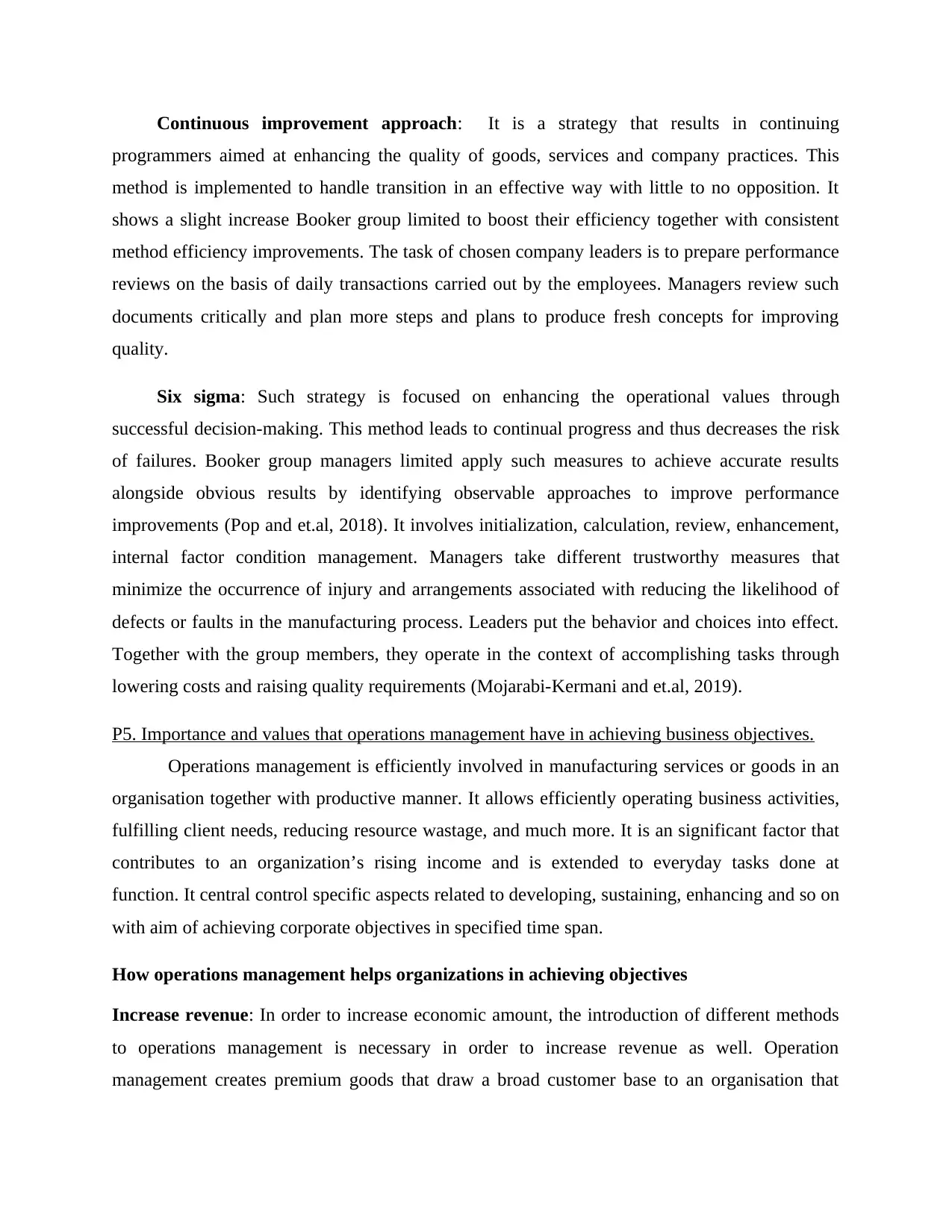
Continuous improvement approach: It is a strategy that results in continuing
programmers aimed at enhancing the quality of goods, services and company practices. This
method is implemented to handle transition in an effective way with little to no opposition. It
shows a slight increase Booker group limited to boost their efficiency together with consistent
method efficiency improvements. The task of chosen company leaders is to prepare performance
reviews on the basis of daily transactions carried out by the employees. Managers review such
documents critically and plan more steps and plans to produce fresh concepts for improving
quality.
Six sigma: Such strategy is focused on enhancing the operational values through
successful decision-making. This method leads to continual progress and thus decreases the risk
of failures. Booker group managers limited apply such measures to achieve accurate results
alongside obvious results by identifying observable approaches to improve performance
improvements (Pop and et.al, 2018). It involves initialization, calculation, review, enhancement,
internal factor condition management. Managers take different trustworthy measures that
minimize the occurrence of injury and arrangements associated with reducing the likelihood of
defects or faults in the manufacturing process. Leaders put the behavior and choices into effect.
Together with the group members, they operate in the context of accomplishing tasks through
lowering costs and raising quality requirements (Mojarabi-Kermani and et.al, 2019).
P5. Importance and values that operations management have in achieving business objectives.
Operations management is efficiently involved in manufacturing services or goods in an
organisation together with productive manner. It allows efficiently operating business activities,
fulfilling client needs, reducing resource wastage, and much more. It is an significant factor that
contributes to an organization’s rising income and is extended to everyday tasks done at
function. It central control specific aspects related to developing, sustaining, enhancing and so on
with aim of achieving corporate objectives in specified time span.
How operations management helps organizations in achieving objectives
Increase revenue: In order to increase economic amount, the introduction of different methods
to operations management is necessary in order to increase revenue as well. Operation
management creates premium goods that draw a broad customer base to an organisation that
programmers aimed at enhancing the quality of goods, services and company practices. This
method is implemented to handle transition in an effective way with little to no opposition. It
shows a slight increase Booker group limited to boost their efficiency together with consistent
method efficiency improvements. The task of chosen company leaders is to prepare performance
reviews on the basis of daily transactions carried out by the employees. Managers review such
documents critically and plan more steps and plans to produce fresh concepts for improving
quality.
Six sigma: Such strategy is focused on enhancing the operational values through
successful decision-making. This method leads to continual progress and thus decreases the risk
of failures. Booker group managers limited apply such measures to achieve accurate results
alongside obvious results by identifying observable approaches to improve performance
improvements (Pop and et.al, 2018). It involves initialization, calculation, review, enhancement,
internal factor condition management. Managers take different trustworthy measures that
minimize the occurrence of injury and arrangements associated with reducing the likelihood of
defects or faults in the manufacturing process. Leaders put the behavior and choices into effect.
Together with the group members, they operate in the context of accomplishing tasks through
lowering costs and raising quality requirements (Mojarabi-Kermani and et.al, 2019).
P5. Importance and values that operations management have in achieving business objectives.
Operations management is efficiently involved in manufacturing services or goods in an
organisation together with productive manner. It allows efficiently operating business activities,
fulfilling client needs, reducing resource wastage, and much more. It is an significant factor that
contributes to an organization’s rising income and is extended to everyday tasks done at
function. It central control specific aspects related to developing, sustaining, enhancing and so on
with aim of achieving corporate objectives in specified time span.
How operations management helps organizations in achieving objectives
Increase revenue: In order to increase economic amount, the introduction of different methods
to operations management is necessary in order to increase revenue as well. Operation
management creates premium goods that draw a broad customer base to an organisation that
⊘ This is a preview!⊘
Do you want full access?
Subscribe today to unlock all pages.

Trusted by 1+ million students worldwide
1 out of 18
Related Documents
Your All-in-One AI-Powered Toolkit for Academic Success.
+13062052269
info@desklib.com
Available 24*7 on WhatsApp / Email
![[object Object]](/_next/static/media/star-bottom.7253800d.svg)
Unlock your academic potential
Copyright © 2020–2026 A2Z Services. All Rights Reserved. Developed and managed by ZUCOL.





